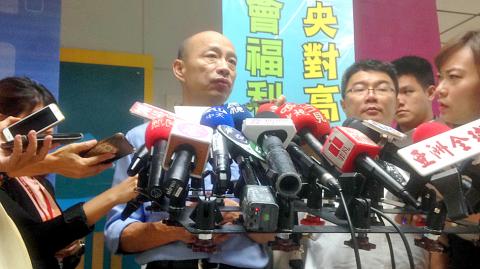Investigators probing allegations of financial impropriety by Kaohsiung Mayor Han Kuo-yu (韓國瑜) when he led Taipei Agricultural Products Marketing Corp (TAPMC) have allegedly found that he disbursed revenue to reward close aides and executives, and was paid an annual salary and incentives totaling NT$4 million (US$128,452 at the current exchange rate), far more than his predecessors.
A probe into Han’s allegedly illicit dealings when serving as TAPMC general manager from January 2013 to January 2017 has found that he used his control over the company’s revenue to pay for executives’ trips abroad, the Chinese-language Mirror Media reported yesterday.
The Taipei District Prosecutors’ Office in a search last week uncovered documents from TAPMC board meetings and company financial records from the period in question, the magazine said.

Photo: Huang Hsu-lei, Taipei Times
Han, who was appointed to the position by the Chinese Nationalist Party (KMT) administration, revamped the system to pay rewards, bonuses and other incentives with company revenue, most of which was awarded to high-ranking executives, while low-ranking staff did not receive any bonuses, the reported cited investigators as finding.
According to the report, Han’s restructuring directly benefited himself, as he received a higher salary and bonuses than his predecessors.
Each year, Han collected about NT$3.5 million, and in his last year received more than NT$4 million, the report said, adding that the previous general manager collected NT$1.95 million in salary and bonuses.
Former TAPMC general manager Wu Yin-ning (吳音寧), who was appointed by the Democratic Progressive Party (DPP) administration, received NT$2.5 million during her term from June 2017 to November last year, Mirror Media reported.
Han allegedly used company revenue and public funds to send executives and friends in the corporation on trips abroad without board approval, and abused his position to give monetary gifts for undue financial benefits and to expand his political influence, the report said.
TAPMC is majority-owned by the Taipei City Government and the Council of Agriculture, and as such, bonuses and rewards must be approved by its board of directors, but Han allegedly gave himself authority to disburse them as favors, the report said.
It also listed TAPMC as having 600 employees, including 164 new staff hired by Han, many of whom were allegedly friends and relatives of Han and his wife.
Asked about the allegations, Han said that all company expenses during his term had been approved during shareholders’ and board meetings.
“All the company’s expenses were legal. What is the point of investigating them now?” Han asked reporters after an interview with KMT Deputy Chairman Hau Lung-bin (郝龍斌) for Broadcasting Corp of China in Kaohsiung.
Many people had warned him that the DPP would try to undermine the KMT’s presidential hopefuls by manipulating prosecutors and via other unjust means, he said.
“I did not believe that, but now I am starting to wonder if that is true,” he added.
He said he hopes that different political parties could remain rational when competing with each other and not resort to mudslinging or spreading rumors, as it would hurt the nation’s democracy.
DPP Taipei City Councilor Liang Wen-jie (梁文傑) condemned Han for using the company’s revenue as a personal treasury.
“During Han’s term as general manager, he gave out rewards and bonuses on a whim, including extra pay for himself, contravening financial regulations. He should be charged with breach of trust,” Liang said.
Additional reporting by Ann Maxon

Taiwan is to commence mass production of the Tien Kung (天弓, “Sky Bow”) III, IV and V missiles by the second quarter of this year if the legislature approves the government’s NT$1.25 trillion (US$39.78 billion) special defense budget, an official said yesterday. Commenting on condition of anonymity, a defense official with knowledge of the matter said that the advanced systems are expected to provide crucial capabilities against ballistic and cruise missiles for the proposed “T-Dome,” an advanced, multi-layered air defense network. The Tien Kung III is an air defense missile with a maximum interception altitude of 35km. The Tien Kung IV and V

The disruption of 941 flights in and out of Taiwan due to China’s large-scale military exercises was no accident, but rather the result of a “quasi-blockade” used to simulate creating the air and sea routes needed for an amphibious landing, a military expert said. The disruptions occurred on Tuesday and lasted about 10 hours as China conducted live-fire drills in the Taiwan Strait. The Civil Aviation Administration (CAA) said the exercises affected 857 international flights and 84 domestic flights, affecting more than 100,000 travelers. Su Tzu-yun (蘇紫雲), a research fellow at the government-sponsored Institute for National Defense and Security Research, said the air

A strong continental cold air mass is to bring pollutants to Taiwan from tomorrow, the Ministry of Environment said today, as it issued an “orange” air quality alert for most of the country. All of Taiwan except for Hualien and Taitung counties is to be under an “orange” air quality alert tomorrow, indicating air quality that is unhealthy for sensitive groups. In China, areas from Shandong to Shanghai have been enveloped in haze since Saturday, the ministry said in a news release. Yesterday, hourly concentrations of PM2.5 in these areas ranged from 65 to 160 micrograms per cubic meter (mg/m³), and pollutants were

Taiwan’s armed forces have established response protocols for a wide range of sudden contingencies, including the “Wan Chun Plan” to protect the head of state, the Ministry of Defense (MND) said today. After US President Donald Trump on Saturday launched a series of airstrikes in Venezuela and kidnapped Venezuelan President Nicolas Maduro, concerns have been raised as to whether China would launch a similar “decapitation strike” on Taiwan. The armed forces regularly coordinate with relevant agencies and practice drills to ensure preparedness for a wide range of scenarios, Vice Minister of National Defense Hsu Szu-chien (徐斯儉) told reporters before a